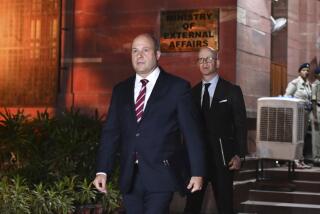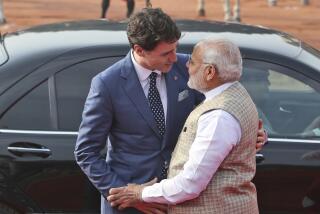Soviet Sentry Shot at Attache, Canada Believes : July Incident in Poland Suggests Use of Deadly Force Is Still Authorized
- Share via
WARSAW — Canadian officials have privately advised Western embassies here that a uniformed man who shot at the Canadian military attache in Poland last month was almost certainly a Soviet sentry.
The Canadian officer, Col. Charles A. Emond, was not wounded in the shooting incident July 6 and has since left Poland, at the end of his tour of duty. In guarded public statements, the Canadian government has said only that an unidentified man in uniform fired at the colonel in a rural area of Poland.
Even though neither Emond nor his car was hit, diplomats consider the incident serious, because it indicates that Soviet troops in Eastern Europe were still authorized to use deadly force against clearly identifiable military attaches more than four months after a Soviet soldier shot and killed U.S. Army Maj. Arthur D. Nicholson Jr. in East Germany.
The killing of Nicholson on March 24 exacerbated already troubled U.S.-Soviet relations.
Canadian Caution
Some Western diplomats in Poland have expressed dismay that the Canadian government has appeared to play down the July incident to avoid bruising its relations with the Soviet leadership. Canada’s muted reaction, these diplomats said, will do little to discourage the Soviets from firing on Western military attaches in the future.
In particular, the diplomats went on, Canada did not publicly disclose the shooting when it occurred and delayed filing a formal protest for almost four weeks. A protest note was handed to the Polish Embassy in Ottawa on July 31, the same day that the Canadian government issued its first public statement on the matter in response to inquiries from reporters.
The statement provided few details and failed to say that the incident occurred near a Soviet military base.
An identical objection was filed with the Polish Foreign Ministry in Warsaw on Aug. 1. The Polish government rejected the protest on Aug. 7, contending that no such incident had occurred. Although Canadian officials strongly believe that a Soviet soldier was involved, the Polish government is technically responsible for the safety of resident envoys.
Helsinki Meeting
The delay in protesting led diplomats in Warsaw to speculate that the Ottawa government wanted to avoid marring the first meeting between its external affairs minister, Joe Clark, and the new Soviet foreign minister, Eduard A. Shevardnadze, which took place in Helsinki on Aug. 1.
Diplomatic sources said they understood that the two officials did not discuss the shooting. Canadian officials have suggested that the delay resulted from an overload of paperwork in Ottawa during preparations for the Helsinki meeting.
In response to reporters’ inquiries at the end of July, Canadian officials said the shooting was a “grave matter” but that the “identity of the person who shot at Col. Emond has not been established.”
However, in briefings given to Western embassies in Warsaw, the Canadians said that while the man’s identity was unknown, his nationality was almost certainly Soviet. It is believed that Emond or his driver recognized the sentry’s uniform.
Under Daylight Conditions
Diplomatic sources said the shooting occurred in clear daylight while Emond and a Canadian Embassy driver were in a rural area near the town of Mszczonow, the site of a Soviet military base, about 25 miles southwest of Warsaw. The sources stressed that distinctive blue-and-white license plates clearly identified the envoy’s brown Volvo sedan as a diplomatic vehicle.
Military attaches, many of whom are professional intelligence officers, are assigned to monitor troop movements and other military developments in Soviet Bloc countries. Under Polish law, they are free to travel around the country except in areas marked as restricted military zones. The Polish government, in rejecting the Canadian protest, made no counterclaim that Emond had violated a restricted area.
“The matter has been investigated thoroughly and comprehensively, and it has been determined that no incident took place involving the military attache of the Canadian Embassy,” the Polish government news agency PAP said Aug. 7.
Diplomats, however, said that Poland has privately invited Canada to submit further evidence but that Ottawa has not yet responded.
More to Read
Sign up for Essential California
The most important California stories and recommendations in your inbox every morning.
You may occasionally receive promotional content from the Los Angeles Times.









